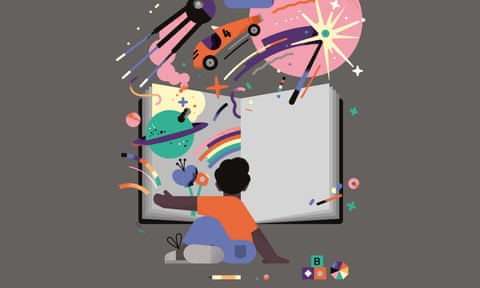We have always given each other strange advice in times of plague. During the yellow fever outbreak in Philadelphia in 1793, it was thought you could purify the air by firing muskets, both indoors and out, and for a while it became impossible to go for a walk without some earnest citizen shooting you in the ear. In London in 1665, it was said that powdered dried toad would protect against the terrifying sweep of death. Tobacco was used to ward off bubonic plagues, with toddlers puffing at pipes at the kitchen table.
But there has been good advice, too, and that advice is more constant across history: we have always told each other to tell stories and try not to despair. Tomaso del Garbo, a Florentine physician working during the 14th-century Black Death, wrote that those who could not “flee the pestilence” must “use songs and games and pleasant stories that do not exhaust the body”. Writing at the same time, Nicholas de Burgo urged that people “take care to be able to be joyful … listen to lullabies, stories and melodies”. A 15th-century revised edition of Aldobrandino of Siena’s Régime du Corps, which circulated widely during epidemic outbreaks, told its readers to “read joyful and strange things”.This prescription was down, in part, to the ancient Galenic idea that fear and sorrow could alter the temperature of a person’s body and thereby render them more prone to sickness: but it was also a sense that, in the midst of horror, we need to be transported.
I am not in the Galen camp: I don’t believe stories will protect us against Covid-19, any more than would strength of character or moral probity. The solutions lie with science and the radical global cooperation of governments, but we will need the stories, even so. Tales of transformation and of emancipation, both real and fictional, can be a set of stars and maps. They point us both towards action and hope. Real hope, I think, is not the promise that everything will be all right, but a sense that the world has so many complexities and possibilities that despair is misplaced; that we still live in a universe shot through with the unexpected. There has never been a decade when we have not taken ourselves by surprise: we have never yet exhausted our capacity for change. I struggle with optimism, but nor am I a pessimist; I tell the children I write for that I am a possibilityist. I truly believe in the potential for human transformation.
So a few weeks ago, in search of that defibrillation for the imagination that happens when the right reader meets the right story (and in truth, in part to fight back at my own sadness and fear), I emailed some of the children’s writers and artists whose work I love most. I asked them to write something, or draw something, anything, that would offer that galvanic sense of possibility even in darkness. The response was glorious, which shouldn’t have surprised me. So many children’s writers and illustrators are themselves already hunters and gatherers of hope; manufacturers and peddlers of wonder.
Now, a few weeks later, the pieces have been collected into The Book of Hopes. The stories and essays and images aren’t explicitly about hope: rather, they aim to create it, through delight or comfort or new ideas, ridiculous jokes, wild heroic tales. There are true accounts of cats and hares and plastic-devouring caterpillars, there are doodles and flowers, revolting and beautiful poems, there are stories of space travel and new shoes and dragons. They are designed to be dipped into: you can eat one with your breakfast and another at midday. The psychoanalyst Donald Winnicott believed that during times of privation, the imagination can be a place of shelter for children. I hope that The Book of Hopes might help, even if only a little.
The collection is a free downloadable PDF, hosted on the website of the National Literacy Trust. It’s dedicated to the doctors, nurses, carers and all those working in hospitals to protect us: they are the stuff that wild, heroic tales are made of.
Katherine Rundell’s fee for this feature has been donated to NHS Charities Together. Her latest adventure story, The Good Thieves, is published by Bloomsbury. The Book of Hopes is available at literacytrust.org.uk.
New Classmates
by Emily Gravett
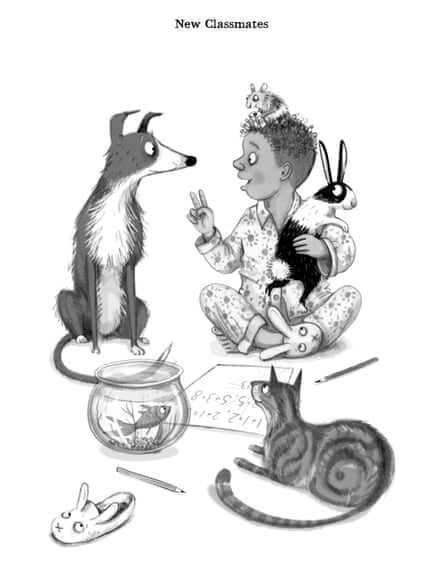
Emily Gravett is the illustrator and author of Meerkat Mail and The Odd Egg (Two Hoots).
Hope
by Anthony Horowitz
The town of Hope, near Aberdeen
Is somewhere I have seldom been
But then it’s not a tourist trap –
It isn’t even on the map!
There’s certainly not much to see
They’ve closed the local library
Because they said there is no need
When no-one in the town can read
They’ve got a pub and a hotel
But neither of them’s doing well
The hotel isn’t quite the Ritz
The beds have fleas: the staff have nits
The only pub, “The Rose and Crown”
Is easily the worst in town
The one theatre’s sadly gone
It burned down while a play was on
(The critics thought the play so dire
That all of them preferred the fire.)
The cinema is second rate
The films are always out of date
The last James Bond film that I saw
Had Bond still played by Roger Moore.
The pavements are never clean
Because the council’s far too mean
To pay for cleaners – and the park
Is only open after dark
The grass is lumpy, full of weeds
And dogs can only walk on leads
There is a children’s playground but
When school is finished, it is shut
The Chief of Police is eighty-two
He can’t catch crooks. He can’t catch flu!
The vicar surely won’t be missed
Since he’s become an atheist
The mayor sold his golden chain
And then was never seen again
The local paper isn’t bought
Because there’s nothing to report.
The school is like a concrete bunker
Matron’s drunk. The head is drunker.
Now, living here must really stink
At least, that is what you might think
But that is simply not the case
There is no more delightful place
The fun and laughter never ends
Everyone is best of friends.
And all the residents agree
There’s nowhere else they’d rather be.
So if you’re feeling uninspired,
Sleeping badly, waking tired
If everything is going wrong.
The day feels dark, the night’s too long
Remember all the people who
Have found the following is true:
It’s so much easier to cope
If you decide to live in Hope.
© Anthony Horowitz 2020
Anthony Horowitz’s latest book in the Alex Rider series, Nightshade, is published by Walker.
The Hope Tree
by Axel Scheffler
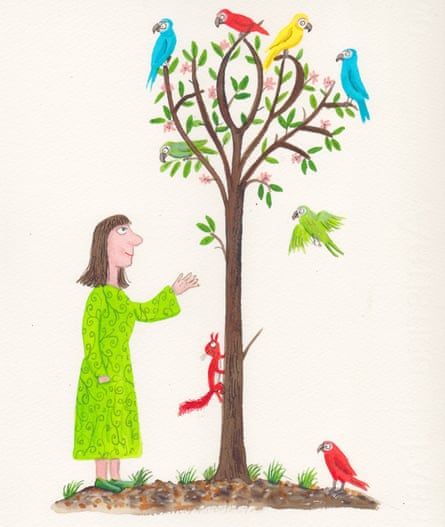
Axel Scheffler is the illustrator of The Gruffalo, Zog and Room on the Broom (Pan Macmillan). His latest work is Coronavirus, a free book explaining the pandemic to children.
A Song of Gladness
by Michael Morpurgo
I’ve been talking every morning to blackbird, telling him why we are all so sad at the moment. He sits on his branch and listens.
It was blackbird’s idea. He sang out this morning at dawn from his treetop in the garden, to fox half asleep behind the garden shed. She thought it a good idea too. It was a wake-up call. Fox was on her feet at once, and trotting through Bluebell Wood, where she barked it to deer who ran off across the stream. Kingfisher was there, otter and dipper too. They heard, and piped it on, and swallow swooped down over the meadow, and passed it on to cows waiting to go into their milking, and to sheep resting quietly under the hedge with her lambs in the corner of the dew-damp field.
And they all agreed, bleating it out to bees already busy at their flowers, to weaving spiders, and grasshoppers, and scurrying mice. Trees heard sheep calling too, the whole flock of them, and waved their budding leaves in wild enthusiasm; and high above, the clouds wandered through the skies driven by wind, and wind took blackbird’s idea over the cliffs across heaving seas, where gulls and albatross cried it out, and whales and dolphins and porpoises heard it, and wailed and whooped it down into the deep, where turtles listened, and they too loved the idea. So did plankton and every fish and crab and sea urchin and whelk, they all whispered that it was a fine notion, the best they ever heard.
And the whisper went over the sea on the curling waves to the shores of Africa, where lions roared their approval, and elephants trumpeted it, leopards yawned it, water buffalo belched it, wild dogs yelped it. Wildebeest murmured it out across the savanna; and storm lifted the idea up over rainforests, where rain took it and poured it down on gorillas in the mist, on chimpanzees in their sleeping nests. Howler monkeys and gibbons echoed their calls loud over all the earth – they are that loud; and then from far up high, sun heard it too and shone it down over deserts where oryx stamped her foot impatient to be getting on with it and doing it – she loved the idea that much. Even camel, who rarely joined in anything, thought this was the best and most beautiful idea he had ever heard.
Back in the garden, blackbird waited till everyone was ready. And then he began to sing. And the whole carnival of animals, every living thing on this good earth joined in, until the globe echoed with the joy of it.
And blackbird was very pleased.
But I was still lost in sadness, as I heard the earth singing around me. It was a song of forgiveness. I knew that. So I asked blackbird if I could join in. And he sang his answer back to me.
“Why do you think we are doing this, you silly man? We want you and yours to be happy again. Only then will you treat us and the world right again, as you know you should. Only then will all be well. Sing, silly man, sing, sing. Our song is your song, your song is our song.”
So I sang, we all sang, sang away our sadness. In every house and flat and cottage, we clapped and sang, in every hut and tent, in every palace and hospital and prison. And they heard and we heard our song of gladness echoing all together, in glorious harmony across the universe.
© Michael Morpurgo 2020
Michael Morpurgo founded the Farms for City Children charity.
Peanut
by Rob Biddulph
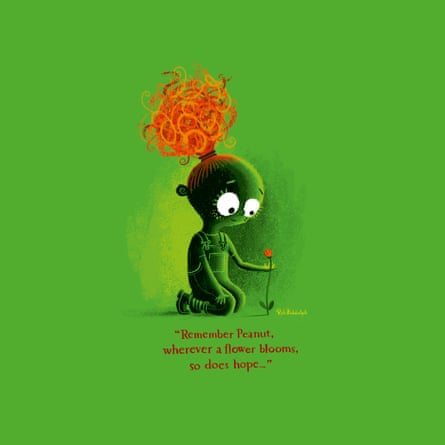
Rob Biddulph is the illustrator of books including Blown Away, GRRRRR! and Odd Dog Out (HarperCollins Children’s Books).
HOPE
by Chris Haughton
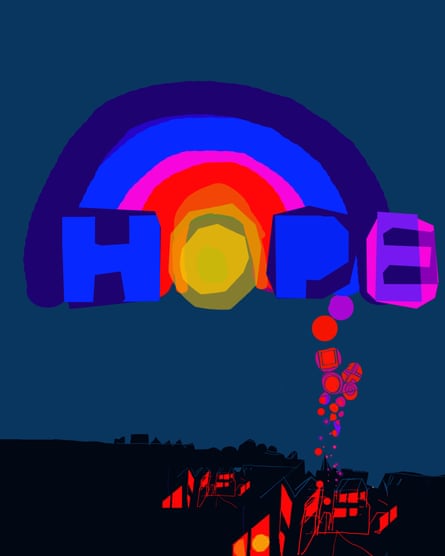
Chris Haughton is the illustrator and author of Oh No, George! and A Bit Lost (Walker Books).
Care of Exotic Pets: Number 1.
The Axolotl at Bedtime
by Catherine Johnson
Never give your axolotl chocolatl in a botl
Serve it in a tiny eggcup, not too cold and not too hotl.
Make him sip it very slowly, not too much, never a lotl.
After all, he’s just a sleepy, snuggly, bedtime, axolotl.
Then tuck him – very gently – in his hand carved wooden cotl.
Turn the light out, seven thirty, never later, on the dotl.
Sing him songs of salamanders, give it everything you’ve gotl
As there’s nothing like a tune to serenade your axolotl.
Brush his gills out on the pillow, never mind the whys or whatl.
Once he’s deeply all a-slumber, sweetly snoring, off you trotl.
Think of him, snug in his dreamland, flying kites or sailing yachtl.
Then you’ll sigh, you’ve done your duty, time to clean the pans and potl.
Come tomorrow he’ll be one fresh, keen as mustard, axolotl.
© Catherine Johnson 2020
Catherine Johnson’s latest books are Race to the Frozen North (Barrington Stoke) and Freedom (Scholastic).
Everything Crossed
by Steven Lenton

Steven Lenton is the illustrator of Shifty McGifty and Slippery Sam by Tracey Corderoy (Nosy Crow), as well as books by David Baddiel and Frank Cottrell-Boyce.
Fake a smile
by Jim Smith

Jim Smith is the illustrator and author of the Barry Loser series and the Super Weird Mysteries series (Egmont).
New Boots
by Jacqueline Wilson
There’s a huge hole in my right boot and the sole flaps madly on my left. Our Lily used to pass down her boots to me, but now my feet have grown too big, even though she’s much older than me. She’s away in service, working as a lady’s maid.
I don’t want to be a lady’s maid. I want to be the lady! My teacher says I’ve got a chance of getting a scholarship to the Girls’ High School next year. I go past it when I go to Biggerton market on errands for Ma. I can’t see me fitting in with all those posh girls in their fancy uniform to be honest. Mind you, I don’t really fit in at the village school either.
They all call me Spud. It is not my real name, obviously. Ma gave us girls flowery names. I’m Rose, and my older sisters are Lily and Violet. I’m called Spud because of my brown frock. Ma made it out of cheap material, and it’s so coarse it sets me itching something chronic. The children at school say it’s made out of old potato sacking. Hence Spud.
If I ever get to be a Lady I shall wear silk frocks all the shades of the rainbow. Though a queen is the highest lady in the land and poor old Victoria wears nothing but black every day.
There’s a wonderful evening gown in the Draper’s shop window in Biggerton. It’s a rich Prussian blue, with red satin trimmings and red cut-glass beads on the bodice. Someone has arranged a pair of scarlet kid boots beside the deep blue hem, the perfect touch.
I am here to buy flour and cheese and a dozen eggs because our old Henny Penny’s stopped laying, but now I have the groceries I must have one more look at the dazzling gown.
But when I glimpse the Draper’s window the dress is missing! Has someone purchased my beautiful gown? I rush to see, and the sole on my left boot catches on a pebble. I stagger and land on my knees, juggling flour and cheese and eggs.
The lady from the Draper’s shop dashes out and picks me up.
I burst into tears, and then duck my head, ashamed.
“Don’t cry, child! You’ve saved every single egg! But oh dear, look at the state of your boots!” she says.
The sole has torn right off, and my bare foot is touching the ground now.
“Are these your only pair?” she asks gently, and I nod.
“We don’t really stock children’s boots. The only footwear I have in my shop are scarlet boots to go with an evening gown, but the lady who bought it didn’t care for the ensemble. They’re ridiculously fancy and probably far too big for you, but you’re welcome to try them,” she says.
They’re a perfect fit for my big feet! The kid feels soft as a glove but the sole is stout.
“They’re the most beautiful boots in all the world – but I couldn’t possibly afford them,” I say, sniffing.
The lady looks at me. She looks at the boots.
“Take them, dear,” she says. “When you start earning you can come and pay me. How about that?”
Oh joy! When I am a lady I shall buy all my gowns and boots from her! And though I’m still an ungainly girl in a brown dress I feel like a queen. I dance all the way home in my new boots, my beautiful red kid boots!
© Jacqueline Wilson 2020
Jacqueline Wilson’s Love Frankie will be published by Doubleday on 20 August.
Untitled
by Tom Percival
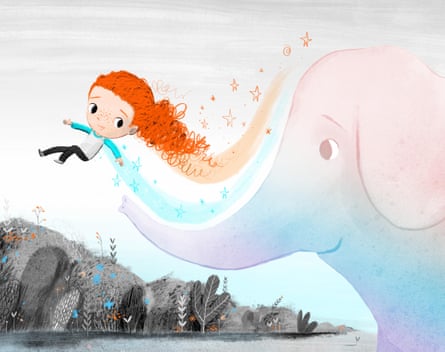
Tom Percival is the illustrator and author of Ruby’s Worry and Perfectly Norman (Bloomsbury Children’s Books).
